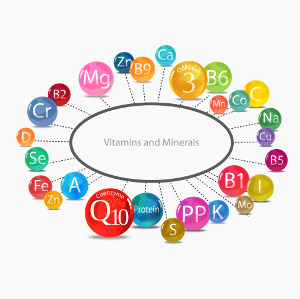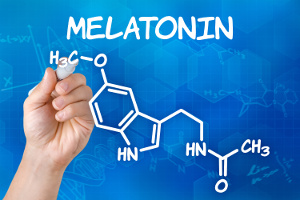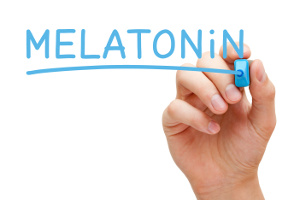 Ageing is linked to uncontrolled, low-grade inflammation, also known as inflammaging, according to articles published in the journals Nature Medicine and Ageing and Disease. Although chronic inflammation is not felt directly it may set the stage for cardiovascular disease, rheumatism, Alzheimer’s disease, and cancer. Chronic inflammation may also cause virus infections like influenza and COVID-19 to become life-threatening because the immune defense suddenly overreacts and attacks healthy tissue. It is therefore vital for ageing people to protect themselves against chronic inflammation, which means getting plenty of vitamin D, selenium, coenzyme Q10, zinc, omega-3, and melatonin. These are all things that many older people often lack.
Ageing is linked to uncontrolled, low-grade inflammation, also known as inflammaging, according to articles published in the journals Nature Medicine and Ageing and Disease. Although chronic inflammation is not felt directly it may set the stage for cardiovascular disease, rheumatism, Alzheimer’s disease, and cancer. Chronic inflammation may also cause virus infections like influenza and COVID-19 to become life-threatening because the immune defense suddenly overreacts and attacks healthy tissue. It is therefore vital for ageing people to protect themselves against chronic inflammation, which means getting plenty of vitamin D, selenium, coenzyme Q10, zinc, omega-3, and melatonin. These are all things that many older people often lack.
- and a melatonin deficiency plays a crucial role
 Sleep deficiency is a common problem that is linked to lifestyle, and many people actually get used to it. Still, chronic lack of sleep is very bad for your health and is associated with accelerated ageing and a risk of cardiovascular disease, according to a study that is published in the science journal, Communication Biology. Research from the last decades has demonstrated how the hormone, melatonin, optimizes sleep and serves as a powerful antioxidant that protects cells. One of the world’s leading melatonin researchers, Dr. Walter Pierpaoli, refers to melatonin as the “miracle hormone” that is able to delay ageing by way of several mechanisms. In the following, you can read more about the ageing process, how to optimize your melatonin levels, and why a melatonin supplement can be a perfect solution with a positive impact on your health and life expectancy.
Sleep deficiency is a common problem that is linked to lifestyle, and many people actually get used to it. Still, chronic lack of sleep is very bad for your health and is associated with accelerated ageing and a risk of cardiovascular disease, according to a study that is published in the science journal, Communication Biology. Research from the last decades has demonstrated how the hormone, melatonin, optimizes sleep and serves as a powerful antioxidant that protects cells. One of the world’s leading melatonin researchers, Dr. Walter Pierpaoli, refers to melatonin as the “miracle hormone” that is able to delay ageing by way of several mechanisms. In the following, you can read more about the ageing process, how to optimize your melatonin levels, and why a melatonin supplement can be a perfect solution with a positive impact on your health and life expectancy.
 There are around 750,000 people in Denmark who take several medical drugs per day, and the number of users is on the rise. What many people are unaware of is that different drugs can disrupt the body’s ability to absorb or utilize one or several nutrients, especially things like B vitamins, vitamin C, vitamin D, vitamin K2, magnesium, potassium, calcium, zinc, iron, and coenzyme Q10. It is therefore vital to get sufficient amounts of the mentioned nutrients to reduce the risk of adverse effects.
There are around 750,000 people in Denmark who take several medical drugs per day, and the number of users is on the rise. What many people are unaware of is that different drugs can disrupt the body’s ability to absorb or utilize one or several nutrients, especially things like B vitamins, vitamin C, vitamin D, vitamin K2, magnesium, potassium, calcium, zinc, iron, and coenzyme Q10. It is therefore vital to get sufficient amounts of the mentioned nutrients to reduce the risk of adverse effects.
 In the summertime, we synthesize vitamin D in our skin when we expose ourselves to sunlight. Vitamin D is a nutrient that is of vital importance to mood and health in general. When it is dark outside, we produce melatonin, which is important for our sleep. In addition to that, melatonin has a number of other important functions. Over the past decades, science has focused on its potential in the prevention of cancer, Alzheimer’s disease, sclerosis, and several other diseases. Apparently, vitamin D and melatonin work as hormones day and night and are of vital importance to the immune system. Also, they regulate inflammation, protect cells, and have many other functions. In a new review article that is published in Nutrients, the scientists refer to melatonin as the “next vitamin D”. Also, they mention that many people get too little sunlight during the day and too little darkness at night, which results in a deficiency of both vitamin D and melatonin.
In the summertime, we synthesize vitamin D in our skin when we expose ourselves to sunlight. Vitamin D is a nutrient that is of vital importance to mood and health in general. When it is dark outside, we produce melatonin, which is important for our sleep. In addition to that, melatonin has a number of other important functions. Over the past decades, science has focused on its potential in the prevention of cancer, Alzheimer’s disease, sclerosis, and several other diseases. Apparently, vitamin D and melatonin work as hormones day and night and are of vital importance to the immune system. Also, they regulate inflammation, protect cells, and have many other functions. In a new review article that is published in Nutrients, the scientists refer to melatonin as the “next vitamin D”. Also, they mention that many people get too little sunlight during the day and too little darkness at night, which results in a deficiency of both vitamin D and melatonin.
 Overweight is looked upon as a global epidemic with grave consequences for public health. In a new review article that is published in International Journal of Molecular Sciences, scientists look closer at the relation between melatonin and overweight. Primarily known for its role as a sleep hormone, melatonin is also important for the body’s carbohydrate and lipid metabolism. The authors study melatonin’s role in the body’s energy metabolism and in oxidative stress and inflammation, which is known to make overweight bad for your health. They also look at how melatonin affects the circadian rhythm and its role in sleep disturbances and the gut flora that also influence body weight.
Overweight is looked upon as a global epidemic with grave consequences for public health. In a new review article that is published in International Journal of Molecular Sciences, scientists look closer at the relation between melatonin and overweight. Primarily known for its role as a sleep hormone, melatonin is also important for the body’s carbohydrate and lipid metabolism. The authors study melatonin’s role in the body’s energy metabolism and in oxidative stress and inflammation, which is known to make overweight bad for your health. They also look at how melatonin affects the circadian rhythm and its role in sleep disturbances and the gut flora that also influence body weight.
 Neurological diseases are on the rise and Alzheimer’s disease is one of the leading causes of dementia. Now, scientists from Boston University have discovered that slow-moving brain waves during our sleep initiate a cleansing process in the brain that protects against Alzheimer’s disease, dementia, and other neurological disorders. Also, a study of men conducted by scientists from Uppsala University in Sweden demonstrated that as little as a single night without sleep increases levels of proteins that serve as biomarkers of Alzheimer’s disease. It is therefore essential to sleep properly every single night so that we can remain mentally alert and vital. In cases where the normal guidelines for healthy sleep prove to be of little use, supplementing with the “sleep hormone” melatonin may turn out to offer relief.
Neurological diseases are on the rise and Alzheimer’s disease is one of the leading causes of dementia. Now, scientists from Boston University have discovered that slow-moving brain waves during our sleep initiate a cleansing process in the brain that protects against Alzheimer’s disease, dementia, and other neurological disorders. Also, a study of men conducted by scientists from Uppsala University in Sweden demonstrated that as little as a single night without sleep increases levels of proteins that serve as biomarkers of Alzheimer’s disease. It is therefore essential to sleep properly every single night so that we can remain mentally alert and vital. In cases where the normal guidelines for healthy sleep prove to be of little use, supplementing with the “sleep hormone” melatonin may turn out to offer relief.
 Chronic lack of sleep is a very common problem. Many people who suffer from this problem feel that it gets worse during the summer because it is difficult to fall asleep when it is still light outside. Being unable to sleep properly can be a substantial stress factor, especially if you have to get up early. Losing as little as one hour of sleep can affect your concentration, mood, immune defense, fertility, and your need for sugar and stimulants. Also, chronic lack of sleep increases your risk of overweight, accelerated ageing, depression, Alzheimer’s disease, cardiovascular disease, cancer, and a lot more. According to an article that is published in MedicalNewsToday, the natural hormone melatonin and a few practical guidelines can work wonders for your sleep and this is essential for your health.
Chronic lack of sleep is a very common problem. Many people who suffer from this problem feel that it gets worse during the summer because it is difficult to fall asleep when it is still light outside. Being unable to sleep properly can be a substantial stress factor, especially if you have to get up early. Losing as little as one hour of sleep can affect your concentration, mood, immune defense, fertility, and your need for sugar and stimulants. Also, chronic lack of sleep increases your risk of overweight, accelerated ageing, depression, Alzheimer’s disease, cardiovascular disease, cancer, and a lot more. According to an article that is published in MedicalNewsToday, the natural hormone melatonin and a few practical guidelines can work wonders for your sleep and this is essential for your health.
 Ageing is linked to uncontrolled, low-grade inflammation, also known as inflammaging, according to articles published in the journals Nature Medicine and Ageing and Disease. Although chronic inflammation is not felt directly it may set the stage for cardiovascular disease, rheumatism, Alzheimer’s disease, and cancer. Chronic inflammation may also cause virus infections like influenza and COVID-19 to become life-threatening because the immune defense suddenly overreacts and attacks healthy tissue. It is therefore vital for ageing people to protect themselves against chronic inflammation, which means getting plenty of vitamin D, selenium, coenzyme Q10, zinc, omega-3, and melatonin. These are all things that many older people often lack.
Ageing is linked to uncontrolled, low-grade inflammation, also known as inflammaging, according to articles published in the journals Nature Medicine and Ageing and Disease. Although chronic inflammation is not felt directly it may set the stage for cardiovascular disease, rheumatism, Alzheimer’s disease, and cancer. Chronic inflammation may also cause virus infections like influenza and COVID-19 to become life-threatening because the immune defense suddenly overreacts and attacks healthy tissue. It is therefore vital for ageing people to protect themselves against chronic inflammation, which means getting plenty of vitamin D, selenium, coenzyme Q10, zinc, omega-3, and melatonin. These are all things that many older people often lack.











 Sleep deficiency is a common problem that is linked to lifestyle, and many people actually get used to it. Still, chronic lack of sleep is very bad for your health and is associated with accelerated ageing and a risk of cardiovascular disease, according to a study that is published in the science journal, Communication Biology. Research from the last decades has demonstrated how the hormone, melatonin, optimizes sleep and serves as a powerful antioxidant that protects cells. One of the world’s leading melatonin researchers, Dr. Walter Pierpaoli, refers to melatonin as the “miracle hormone” that is able to delay ageing by way of several mechanisms. In the following, you can read more about the ageing process, how to optimize your melatonin levels, and why a melatonin supplement can be a perfect solution with a positive impact on your health and life expectancy.
Sleep deficiency is a common problem that is linked to lifestyle, and many people actually get used to it. Still, chronic lack of sleep is very bad for your health and is associated with accelerated ageing and a risk of cardiovascular disease, according to a study that is published in the science journal, Communication Biology. Research from the last decades has demonstrated how the hormone, melatonin, optimizes sleep and serves as a powerful antioxidant that protects cells. One of the world’s leading melatonin researchers, Dr. Walter Pierpaoli, refers to melatonin as the “miracle hormone” that is able to delay ageing by way of several mechanisms. In the following, you can read more about the ageing process, how to optimize your melatonin levels, and why a melatonin supplement can be a perfect solution with a positive impact on your health and life expectancy. There are around 750,000 people in Denmark who take several medical drugs per day, and the number of users is on the rise. What many people are unaware of is that different drugs can disrupt the body’s ability to absorb or utilize one or several nutrients, especially things like
There are around 750,000 people in Denmark who take several medical drugs per day, and the number of users is on the rise. What many people are unaware of is that different drugs can disrupt the body’s ability to absorb or utilize one or several nutrients, especially things like  In the summertime, we synthesize
In the summertime, we synthesize  Overweight is looked upon as a global epidemic with grave consequences for public health. In a new review article that is published in International Journal of Molecular Sciences, scientists look closer at the relation between melatonin and overweight. Primarily known for its role as a sleep hormone, melatonin is also important for the body’s carbohydrate and lipid metabolism. The authors study melatonin’s role in the body’s energy metabolism and in oxidative stress and inflammation, which is known to make overweight bad for your health. They also look at how melatonin affects the circadian rhythm and its role in sleep disturbances and the gut flora that also influence body weight.
Overweight is looked upon as a global epidemic with grave consequences for public health. In a new review article that is published in International Journal of Molecular Sciences, scientists look closer at the relation between melatonin and overweight. Primarily known for its role as a sleep hormone, melatonin is also important for the body’s carbohydrate and lipid metabolism. The authors study melatonin’s role in the body’s energy metabolism and in oxidative stress and inflammation, which is known to make overweight bad for your health. They also look at how melatonin affects the circadian rhythm and its role in sleep disturbances and the gut flora that also influence body weight. Neurological diseases are on the rise and Alzheimer’s disease is one of the leading causes of dementia. Now, scientists from Boston University have discovered that slow-moving brain waves during our sleep initiate a cleansing process in the brain that protects against Alzheimer’s disease, dementia, and other neurological disorders. Also, a study of men conducted by scientists from Uppsala University in Sweden demonstrated that as little as a single night without sleep increases levels of proteins that serve as biomarkers of Alzheimer’s disease. It is therefore essential to sleep properly every single night so that we can remain mentally alert and vital. In cases where the normal guidelines for healthy sleep prove to be of little use, supplementing with the “sleep hormone” melatonin may turn out to offer relief.
Neurological diseases are on the rise and Alzheimer’s disease is one of the leading causes of dementia. Now, scientists from Boston University have discovered that slow-moving brain waves during our sleep initiate a cleansing process in the brain that protects against Alzheimer’s disease, dementia, and other neurological disorders. Also, a study of men conducted by scientists from Uppsala University in Sweden demonstrated that as little as a single night without sleep increases levels of proteins that serve as biomarkers of Alzheimer’s disease. It is therefore essential to sleep properly every single night so that we can remain mentally alert and vital. In cases where the normal guidelines for healthy sleep prove to be of little use, supplementing with the “sleep hormone” melatonin may turn out to offer relief. Chronic lack of sleep is a very common problem. Many people who suffer from this problem feel that it gets worse during the summer because it is difficult to fall asleep when it is still light outside. Being unable to sleep properly can be a substantial stress factor, especially if you have to get up early. Losing as little as one hour of sleep can affect your concentration, mood, immune defense, fertility, and your need for sugar and stimulants. Also, chronic lack of sleep increases your risk of overweight, accelerated ageing, depression, Alzheimer’s disease, cardiovascular disease, cancer, and a lot more. According to an article that is published in MedicalNewsToday, the natural hormone melatonin and a few practical guidelines can work wonders for your sleep and this is essential for your health.
Chronic lack of sleep is a very common problem. Many people who suffer from this problem feel that it gets worse during the summer because it is difficult to fall asleep when it is still light outside. Being unable to sleep properly can be a substantial stress factor, especially if you have to get up early. Losing as little as one hour of sleep can affect your concentration, mood, immune defense, fertility, and your need for sugar and stimulants. Also, chronic lack of sleep increases your risk of overweight, accelerated ageing, depression, Alzheimer’s disease, cardiovascular disease, cancer, and a lot more. According to an article that is published in MedicalNewsToday, the natural hormone melatonin and a few practical guidelines can work wonders for your sleep and this is essential for your health. "After about one week of taking the Q10 supplement I could feel a huge difference," says 23-year old Alan Piccini, who has been suffering from extreme fatigue and muscle aches ever since he was a child.
"After about one week of taking the Q10 supplement I could feel a huge difference," says 23-year old Alan Piccini, who has been suffering from extreme fatigue and muscle aches ever since he was a child. “Taking capsules with co-enzyme Q10 has freed me of the severe side effects of my cholesterol lowering medicine,” Mrs Franken explains.
“Taking capsules with co-enzyme Q10 has freed me of the severe side effects of my cholesterol lowering medicine,” Mrs Franken explains.